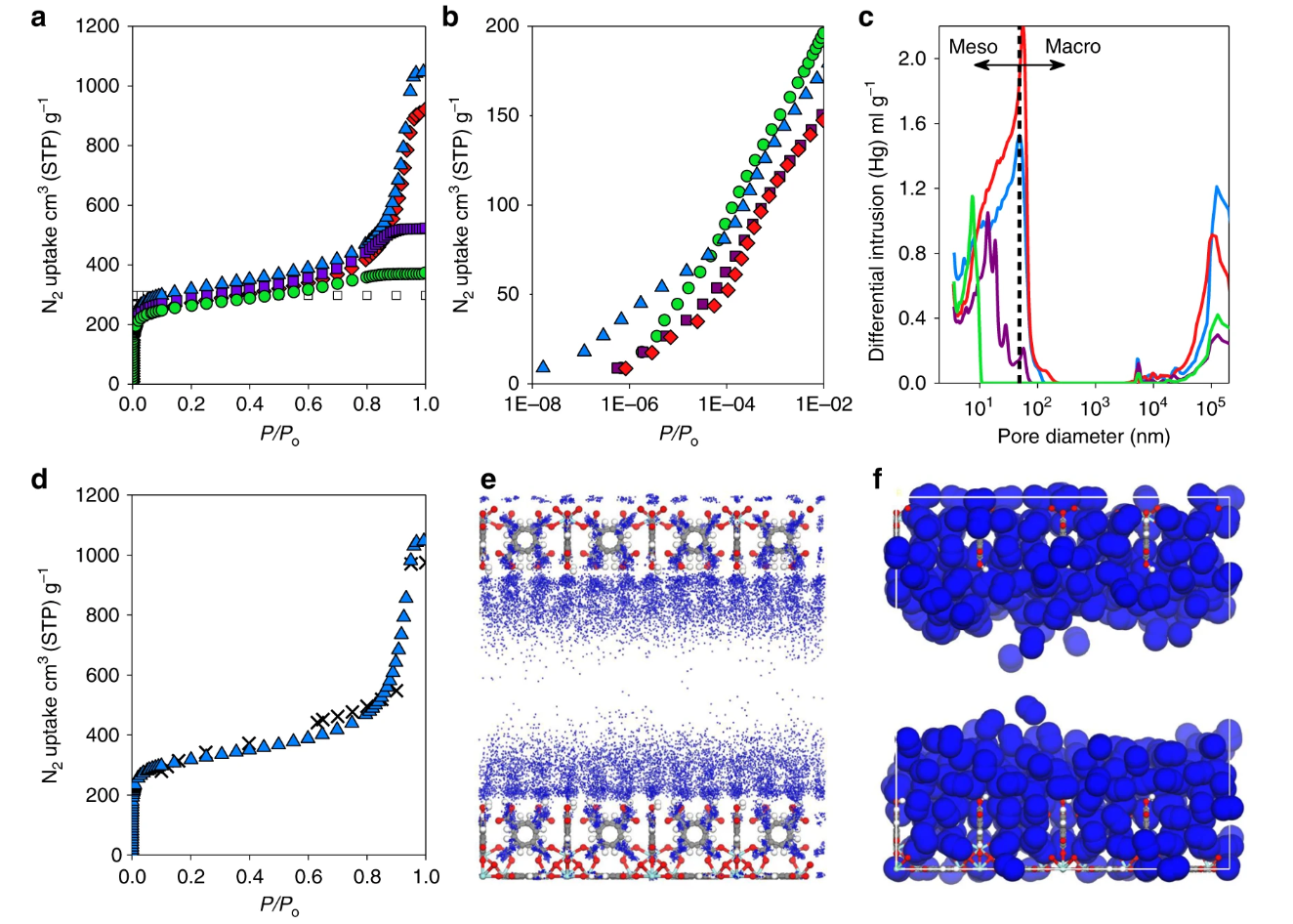Adsorption & Porosimetry Analysis Service
The characterization of surface area, pore structure, and adsorption behavior is fundamental to understanding the physical and chemical properties of materials. Porosity and adsorption phenomena determine how gases, vapors, or liquids interact with solid surfaces and directly influence a material's performance in catalysis, filtration, pharmaceuticals, energy storage, and environmental applications.
Adsorption and porosimetry analysis provides quantitative insights into the relationship between surface chemistry, pore geometry, and material functionality. By combining advanced measurement techniques such as chemical adsorption, dynamic vapor sorption, and mercury intrusion porosimetry, scientists can accurately determine key parameters including surface area, pore size distribution, pore volume, and adsorption isotherms.

Figure 1. N2 Adsorption Isotherms and Hg-Porosimetry Pore-Size Distributions of Metal-Organic Frameworks (UiO-66)
Service at MtoZ Biolabs
MtoZ Biolabs offers a comprehensive Adsorption & Porosimetry Analysis Service that integrates multiple analytical methods to assess material porosity, adsorption capacity, and surface characteristics under precisely controlled conditions. Our platform is designed for both research and industrial applications, supporting quality control, materials optimization, and product innovation across diverse sectors.
We provides a full-spectrum characterization of materials from micro- and mesoporous frameworks to macroporous industrial composites. Our services include the following specialized modules:
💠Chemical Adsorption Analysis Service
Determines surface active sites and chemisorption capacity using static, dynamic, and temperature-programmed approaches (TPR, TPD, TPO). Provides insights into catalytic metal dispersion, reaction kinetics, and adsorption heat.
💠Dynamic Vapor Sorption (DVS) Analysis Service
Measures weight changes in a sample as a function of humidity or vapor concentration, enabling precise assessment of sorption isotherms, moisture uptake, desorption behavior, and diffusion kinetics.
💠Water Activity Analysis Service
Quantifies the free water activity (Aw) within a sample, reflecting microbial growth potential, chemical stability, and product shelf life, particularly relevant for food, pharmaceuticals, and biological materials.
💠Capillary Flow Porometry Analysis Service
Determines pore size distribution, mean flow pore diameter, and permeability by analyzing fluid displacement through porous membranes or filters, supporting applications in filtration, coatings, and separation media.
💠Micropore Measurement Analysis Service
Utilizes gas adsorption (e.g., N₂ or CO₂) at cryogenic temperatures to characterize pores smaller than 2 nm, providing accurate BET surface area and pore volume data for catalysts and adsorbents.
💠Mesopore Measurement Analysis Service
Focuses on pores ranging from 2–50 nm, using adsorption–desorption isotherms to reveal pore geometry and hysteresis behavior in ceramics, polymers, and composites.
💠Mercury Porosimetry Based Porosity and Pore Size Distribution Analytical Service
Applies controlled-pressure mercury intrusion to quantify porosity, pore size distribution, pore volume, and specific surface area across the 3 nm–360 µm range, ideal for dense or coarse materials.
Analysis Workflow

Service Advantages
✔️Advanced Analytical Platform: Integration of gas adsorption, vapor sorption, and porosimetry systems for full-spectrum pore characterization.
✔️High Accuracy and Reproducibility: Automated control of pressure, temperature, and humidity ensures precise and consistent results.
✔️Comprehensive Solutions: End-to-end analysis from micropore detection to macropore distribution.
✔️Scientific Expertise: Multidisciplinary team with extensive experience in materials science, catalysis, and pharmaceutical R&D.
✔️Customizable Approaches: Tailored testing strategies to meet specific research and industrial requirements.
Applications
1. Catalysis and Surface Chemistry: Characterization of metal dispersion, active surface area, and adsorption kinetics for heterogeneous catalysts.
2. Pharmaceutical Formulation: Evaluation of excipient porosity, water activity, and vapor sorption affecting drug stability and dissolution.
3. Construction and Ceramic Materials: Porosity profiling in cement, ceramics, and composites to assess strength and durability.
4. Environmental Science: Assessment of sorbents for pollutant removal, CO₂ capture, and humidity control.
5. Food and Biological Samples: Water activity and vapor sorption studies to predict microbial stability and shelf life.
Deliverables
1. Comprehensive Experimental Details
Instrument specifications, analytical conditions, and calibration parameters.
2. Raw Data Files
Including pressure–volume curves, adsorption–desorption isotherms, mass change profiles, and other relevant datasets.
3. Graphical Outputs
Pore size distribution plots, hysteresis loops, surface area diagrams, and additional visual representations of adsorption or porosity behavior.
4. Analytical Report Tailored to Projects
Results with data interpretation, comparative analysis, and conclusions.
MtoZ Biolabs' Adsorption & Porosimetry Analysis Service delivers a unified platform for understanding the structural and functional properties of porous materials. By combining high-precision instrumentation with expert interpretation, we enable researchers and engineers to make data-driven decisions that advance innovation in materials development, catalysis, and formulation design. Free project evaluation, welcome to learn more details.
How to order?







